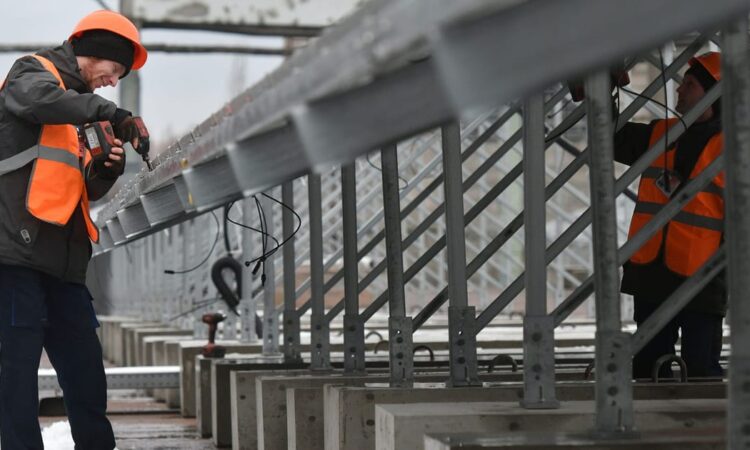
Press play to listen to this article
Voiced by artificial intelligence.
Laurence Tubiana is the chief executive of the European Climate Foundation and the former architect of the 2015 U.N. Paris Agreement on Climate Change
In the 21st century, standing alongside an invaded country requires more than providing diplomatic and military support. Thus, there’s a growing consensus that Europe must focus on a sustainable economic recovery for Ukraine.
Along these lines, a new donor coordination body has just begun work to bring together international support for the country’s reconstruction. And last month, G7 nations confirmed they were backing “the sustainable and resilient recovery and green reconstruction of Ukraine.
Rebuilding a prewar version of Ukraine would be unthinkable. An old-style economy based on fossil fuels means fragile sovereignty, and it would scare off investors wary of financing assets that belong in the last century. It would be no recovery at all.
Renewables, however, are aligned with peace, security and independence for Ukraine. They are the building blocks of a modern economy, attracting private investment and positioning the country alongside its European neighbors.
This is what Ukraine’s government, and its people, need from Europe.
This week, the international community is preparing to gather for the Ukraine Recovery Conference in London. This meeting presents an opportunity to raise our ambition for Ukraine’s recovery, and for governments, businesses and investors alike to commit to their role in it.
They should all be encouraged by a simple truth: Ukraine’s green recovery has already begun.
Today, solar power is already making Ukraine’s hospitals safer and more resilient. After Russian attacks on hospitals left some without power for months, doctors had reported carrying out operations using headlamps. In response, NGO Ecoclub began fitting solar panels to Ukrainian hospitals, equipping them with reliable, cheap and clean energy.
Take, for example, Horenka hospital on the outskirts of Kyiv. After a Russian missile strike destroyed it, the hospital was rebuilt with a heat pump, solar power system and battery storage. This green technology protects the hospital, and its equipment, from power outages, it’s cheaper and quieter than a traditional generator and, of course, it reduces greenhouse gas emissions.
Meanwhile, last month, a German-Ukrainian partnership began installing thousands of solar panels on critical infrastructure in Ukraine.
So, an energy system powered by wind and sun isn’t just greener in the long term, it’s also helping Ukrainians get through the war right now.
Projects like these lay the foundations for a Ukraine fit for the future: A Ukraine with modern renewable infrastructure that protects its energy independence; with low-emissions energy systems, electrified transport and decarbonized industries that attract private investment; and with high environmental standards and sustainable agriculture that create a healthier future for all its citizens.
This is why towns and cities across Ukraine are so conscious of the need to build back better, combining emergency help with sustainable long-term solutions. Our role as Europeans is to support these communities and municipalities now, in order to fund renewable energy sources at the local level. And relevant insurance to secure investors and concessional loans are among the instruments that will scale up the country’s recovery.
Meanwhile, this transformation will also help Ukraine keep pace with the rest of Europe as our Continent marches toward net zero. And the European Political Community — first proposed by French President Emmanuel Macron — is recognition of the need for a united front on this, embodying the spirit of all Europeans working together to protect common values.
Political solidarity for Ukraine means reconstructing a country with independent energy supplies, modern infrastructure and a sustainable economy. It’s time for a united mission between governments, citizens and businesses to prepare Ukraine for its bright future.






